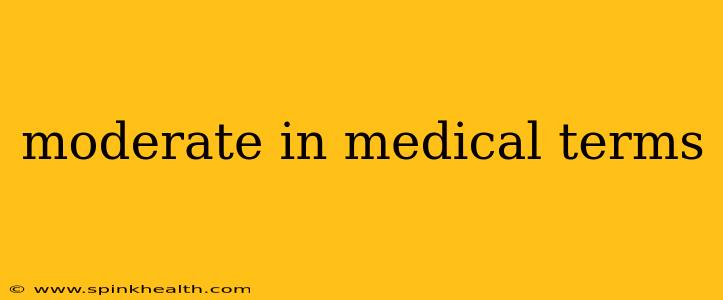Moderate: Navigating the Nuances of a Common Medical Term
The word "moderate" pops up frequently in medical contexts, but its meaning isn't always crystal clear. It's a chameleon-like term, shifting its meaning depending on the specific condition or measurement being described. Let's delve into the complexities of "moderate" in the medical world, exploring its application across various scenarios and addressing some common questions.
What does "moderate" mean in medical terms?
In essence, "moderate" signifies a level of severity or intensity that falls between mild and severe. It's a relative term, meaning its precise definition depends heavily on the context. For instance, moderate pain might be a 5 or 6 on a 10-point pain scale, while moderate obesity might correspond to a specific BMI range. The lack of a universally fixed definition underscores the need for careful consideration of the specific clinical context.
How is "moderate" used to describe different conditions?
The application of "moderate" varies widely across medical specialties. Let's look at a few examples:
-
Moderate pain: This typically indicates discomfort that's noticeable and bothersome but doesn't completely incapacitate the individual. Over-the-counter pain relievers might offer sufficient relief.
-
Moderate dehydration: This signifies a fluid deficit that's causing some noticeable symptoms like mild dizziness or fatigue, but it's not yet life-threatening. Oral rehydration is usually sufficient.
-
Moderate hypertension (high blood pressure): This refers to blood pressure readings that are elevated above the normal range but not yet classified as severe or hypertensive crisis. Lifestyle modifications and medication may be recommended.
-
Moderate obesity: This indicates a BMI within a specific range, often between 30 and 35, representing a higher risk for health complications than normal weight but not as high as severe obesity.
-
Moderate intellectual disability: This classification falls within a specific IQ range, reflecting cognitive abilities that are below average but still allow for some degree of independence.
What are some examples of moderate severity illnesses?
Many illnesses can present with moderate severity. This could include things like:
-
Moderate asthma: Characterized by symptoms like wheezing and shortness of breath that interfere with daily activities but don't require immediate emergency medical attention.
-
Moderate acne: Involving a noticeable number of pimples, blackheads, and whiteheads that may cause some scarring.
-
Moderate depression: Presenting with symptoms like sadness, loss of interest, and sleep disturbances that impact daily functioning, but not to the extent of severe depression.
How is "moderate" different from "mild" and "severe"?
The difference lies in the degree of impact on the individual. "Mild" implies minimal symptoms and little disruption to daily life. "Severe" signifies significant symptoms, potentially life-threatening complications, and substantial interference with daily activities. "Moderate" sits in between, representing a noticeable impact but not necessarily a critical one.
Is "moderate" always a precise medical term?
No. The inherent subjectivity of "moderate" makes it less precise than numerical measurements or objective findings like lab results. Clinicians use their professional judgment, considering the patient's overall health, symptoms, and response to treatment to determine if a condition is "moderate." It's a useful descriptor in clinical settings, but it's crucial to remember its contextual nature. Clear communication between patient and clinician is essential to ensure accurate interpretation. This often involves discussing symptoms, pain scales, and the impact on quality of life.
This discussion serves as a starting point for understanding the complexities of "moderate" in medicine. Always consult with a healthcare professional for accurate diagnosis and treatment of any medical condition. Remember, this information is for educational purposes only and should not be considered medical advice.

